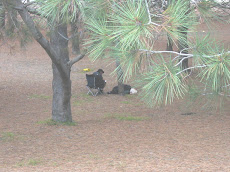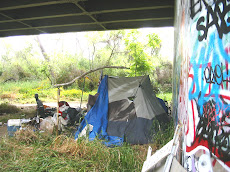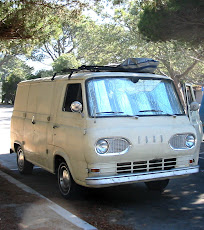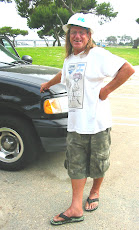I have heard it more often than my conscience can bear, and I repeat it here with regret: many of the homeless are on the street because they want to be.
The last time I heard this mistaken notion was yesterday from a young woman with whom I work and of whom I am fond. Laurie is having a fairy-tale wedding in a few months and continues on to graduate school next year. We had planned some social time, and Laurie suggested we meet at my place. In a rare moment of candor, I told her I didn't have one.
"Oh, oh. I understand, " Laurie said, measuring her words. "I understand completely." Laurie has a soft voice. Indeed, she has a soft appearance. She is small-built, bird-like, with alabaster skin and the kind of dark eyes and light hair that the Spanish once regarded as the mark of great beauty. I was more accustomed, though, to hearing her speak rapid-fire in the style of urban cool.
I wanted to explain, but she interrupted me. "Say no more. It's OK. I understand. Really I do."
It was Laurie who did the talking: her mother had been a drug addict. The sketch of her past told of constant moves, confrontations with fear and dark forces, and a resignation to an eternity of mistrust and abhorrence of her mother. That Laurie knows firsthand about homeless life is without question, but she also mentioned casually that numerous people she had met on the street wanted to be there. They had money, she said, but, for some reason, chose the street over a place to live. I listened without remarking.
After all, this had been Laurie's childhood experience. As a child, she would not have had a knowledge of the larger context in which adults conduct their lives. Unfortunately, it seemed, the underlying rejection of her mother, including her homelessness, took the form of an oversimplification. There had been too much hurt, and Laurie was not about to think too much about her past in an effort to extend unqualified compassion.
While I am a child of the nineteen-sixties, the country had already undergone the Reagan revolution by the time Laurie could walk. Homelessness was everywhere and growing, as it still is. It was not long before homelessness was a fixture of the American urban landscape, and America joined the world. The Third World.
What bothers me the most about homelessness is how it is taken for granted.
Try to find someone who remembers a time when there were no homeless in America. Most people have accepted it, and Republicans deny it. An articulate, intelligent Republican spoke to me about homelessness recently. We had been talking about the new Obama Administration and our hopes for the future of the United States. I told him I was most ashamed of homelessness and that I hoped we would make corrective efforts to eradicate it. This man made what I thought was a shocking, blatantly false statement: he claimed that homelessness, on the order we see it today, has always existed, but it was just not as visible.
Visibility is the operative concept here. I countered that homelessness was not visible because there wasn't any, certainly nothing on the scale of what we are seeing today. Of course, there have been pockets of homelessness, often due to natural disasters, the Dust Bowl, the Great Floods of the Mississippi River, and Hurricane Katrina, to cite a few. There were drunks on park benches when I was growing up, but they were not homeless. There were people in flophouses, halfway houses, and numerous other forms of transitional facilities for which there was once funding that dried up with the Reagan years.
The idea was that volunteers and churches in the local community would take care of the people who would no longer have a place to live, that is, after they were made homeless. But federal funds to municipalities were also cut and entities such as public broadcasting had to go begging. Taxes went up, too, for working people.
And Ronald Reagan seemed to hate the working class. As the story goes, a waiter somewhere was discovered to be making a substantial living, mostly in tips, which, of course, he could only be making because tips were, once upon a time, non-taxable. Somehow, Reagan was incensed by the idea that any working person should make good money tax-free. Never mind that few people want to make a career of waiting tables. Never mind that college kids need jobs like waiting tables in order to pay college expenses. Life just got tougher for most of us.
What I see on the street are broken dreams, lives beyond repair, and the abandonment of hope. Sometimes, it is just a case of bad luck that makes a person homeless. Even if homelessness were the outcome of many poor decisions, we are still only human. I am reminded of the movie, Slingblade, when the harmless, open-hearted Karl, now in prison, is asked by another inmate about being out in the world and what it was like. He replies, "It was too big."
It is a big world, and it is not always possible to know enough to do a good job of living in it.
Bad luck and broken dreams have a cumulative effect. We come to think there is no way possible to repair the mistakes, even if our judgment, in hindsight, has improved. We come to live without a past, as that past and everything in it --- the people, places, and memories --- are too painful. One begins a kind of homeless identity and a sense of difference from everyone who still has a home, in the communal sense of the word. Family. Friends. Reasons to get up in the morning.
If ever there were ones in a position to recognize the spiritual and emotional value of home, it is the homeless. It is not that anyone homeless would not like to have a home: what it takes to make a home is beyond reach. With few loved ones, broken relationships, and substance abuse problems to numb the emotional pain, it is little wonder that the homeless who are receiving disability or social security monies are living in the bushes behind trash bins.
Sometimes, what has been broken cannot be repaired. That goes for people and relationships. One would have to start over, but perhaps there is little confidence that a new beginning is possible. Hope may not reach beyond finding a good meal in a dumpster. One may no longer identify with the housed, not because the housed have an actual place to live --- for the bushes for Steve, or my truck, or Bob's truck are also places to live --- but because the housed have the spiritual and emotional components that give life to that dwelling, without which there is nothing particularly compelling about a house. Home has an absolute value.
And, of this I am certain: there is no human being on earth who does not want a home.
How to Decompress Your Back at Home
-
Stepping through your front door after a demanding workday should feel like
crossing a threshold into calm—but without intentional decompression […]





























No comments:
Post a Comment